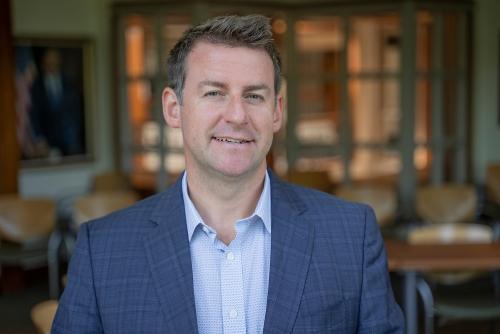
When Nathan Boucher was growing up in Rhode Island, his parents were both U.S. Air Force veterans working in the medical field. Throughout high school Boucher envisioned himself following in his parent’s footsteps, joining the Navy or the Air Force.
Surprisingly, as an undergrad he ended up in an outdoor education program at Northland College. There he also trained as an EMT, worked on an ambulance and first found an interest in the medical field.
Boucher went on to physician assistant school, served his surgical residency in the Bronx, and later received his MS from Northeastern University.

Boucher has been teaching for more than 10 years within the areas of public health, medical care and health policy and has 25 years of experience in the health care field. Although Boucher is not new to Duke or the Sanford School, he is taking a new role, joining Sanford as an assistant research professor of the practice.
Boucher serves as a research health scientist at Durham VA Health Services Research & Development, is a senior fellow at the Duke Center for the Study of Aging & Human Development, and is also a member of the Duke-Margolis Center for Health Policy core faculty. He has also been an adjunct instructor at Sanford.
Boucher’s experience working in many different health care positions gives him the ability to connect classroom content to real-world problems and to share his own personal stories.
“When the hurricanes came along, I was the only one [on my team] living in Manhattan, so I would put on my rain boots and coat and walk three miles down the island with no taxis, no buses, no nothing. During the Sandy and Irene hurricanes I lived at the hospital, for four or five days because no one else from my team could get in,” he said.
Boucher went back to school for his second master’s degree, an MPA with a concentration in health care policy while also managing critical care as chief physician assistant in a Manhattan hospital. He oversaw a 24/7 consultation service for critical care medicine, and ran recovery rooms and two ICUs. After completing his degree, he took a position as a quality improvement administrator for inpatient hospice and palliative care at Bellevue Hospital Center
Later, while working on his doctor of public health (DrPH) in community health sciences at State University of New York-Downstate Medical Center, he was offered the opportunity to run a graduate program for physician assistants in Manhattan.
Boucher moved with his family to North Carolina for his post-doctoral studies at Duke University and the Veterans Affairs Durham Center for Health Services Research and Development. He started as a visiting professor at Sanford in 2016.
Having two veterans as parents gave him a personal stake in his work at the VA. As a VA Career Development Awardee, Boucher is using the 5-year federal grant to develop a community-based lay navigator program, targeting caregivers’ social and practical needs in their complex roles supporting veterans with advanced-stage illnesses. Research shows when caregivers have sufficient social supports, such as food, clothing, transportation and shelter, patients have better health outcomes. After the program is developed Boucher and the research team led by Assistant Professor Nina Sperber will offer people from the community the opportunity to train in the program, followed by a six-month pilot where the research team will study the feasibility and accessibility issues.
This fall Boucher will continue teaching several courses, including Introduction to the U.S. Health Care System, organizational ethics and qualitative research methods in health services research.
Boucher strives to show his students the broad spectrum of services and areas of concentration within the health care field.
“The key in your education, whether it’s in undergrad education or as an adult learner or what have you, is to not pigeonhole yourself based on titles of a degree or titles of a program or even the title of course. There are principles that will be applicable to a lot of different things outside of the course.”
“It’s about how you take that education, whether it’s a one-off course or a certificate or a master’s, and then utilize that in your workplace and sell that to an employer.”